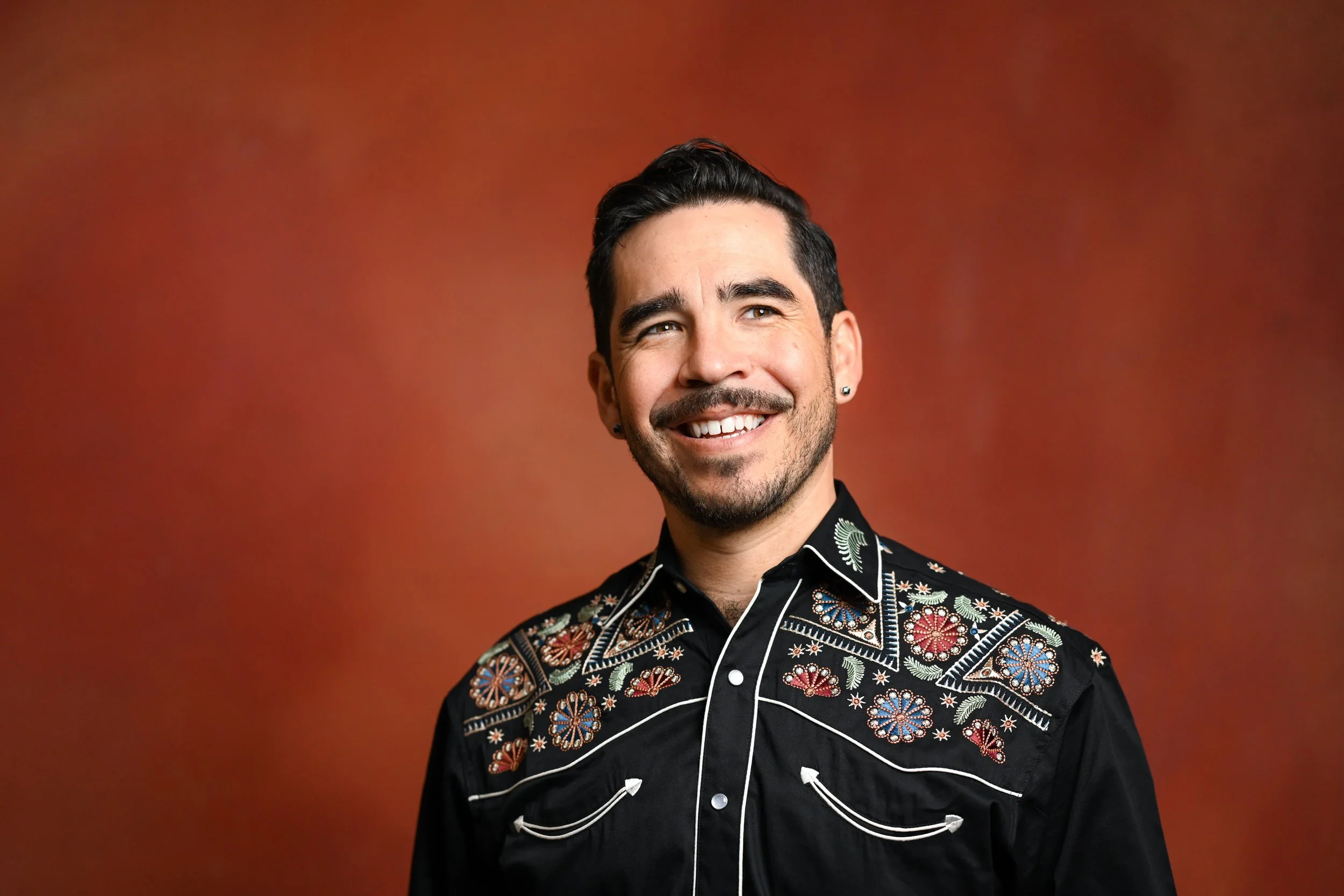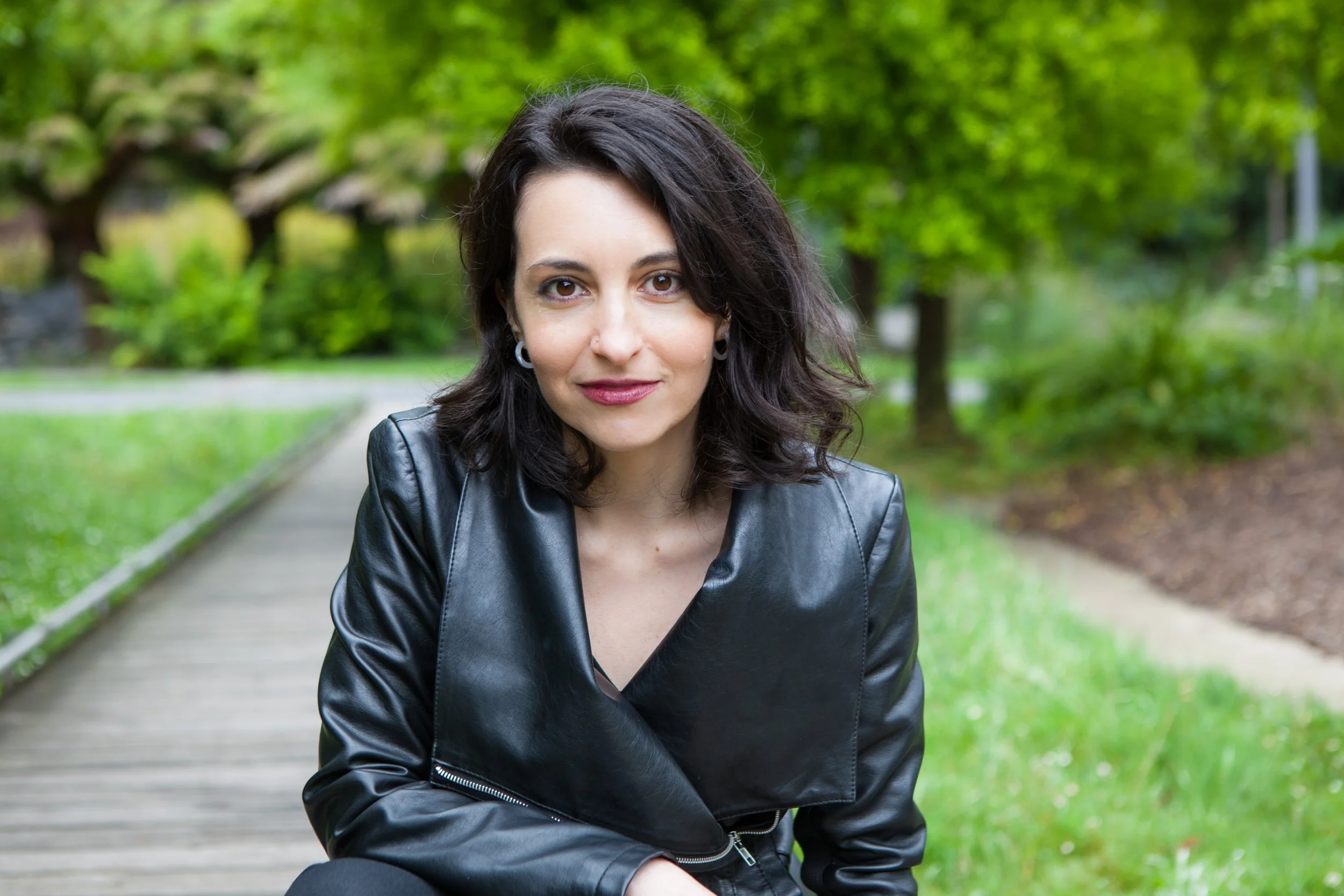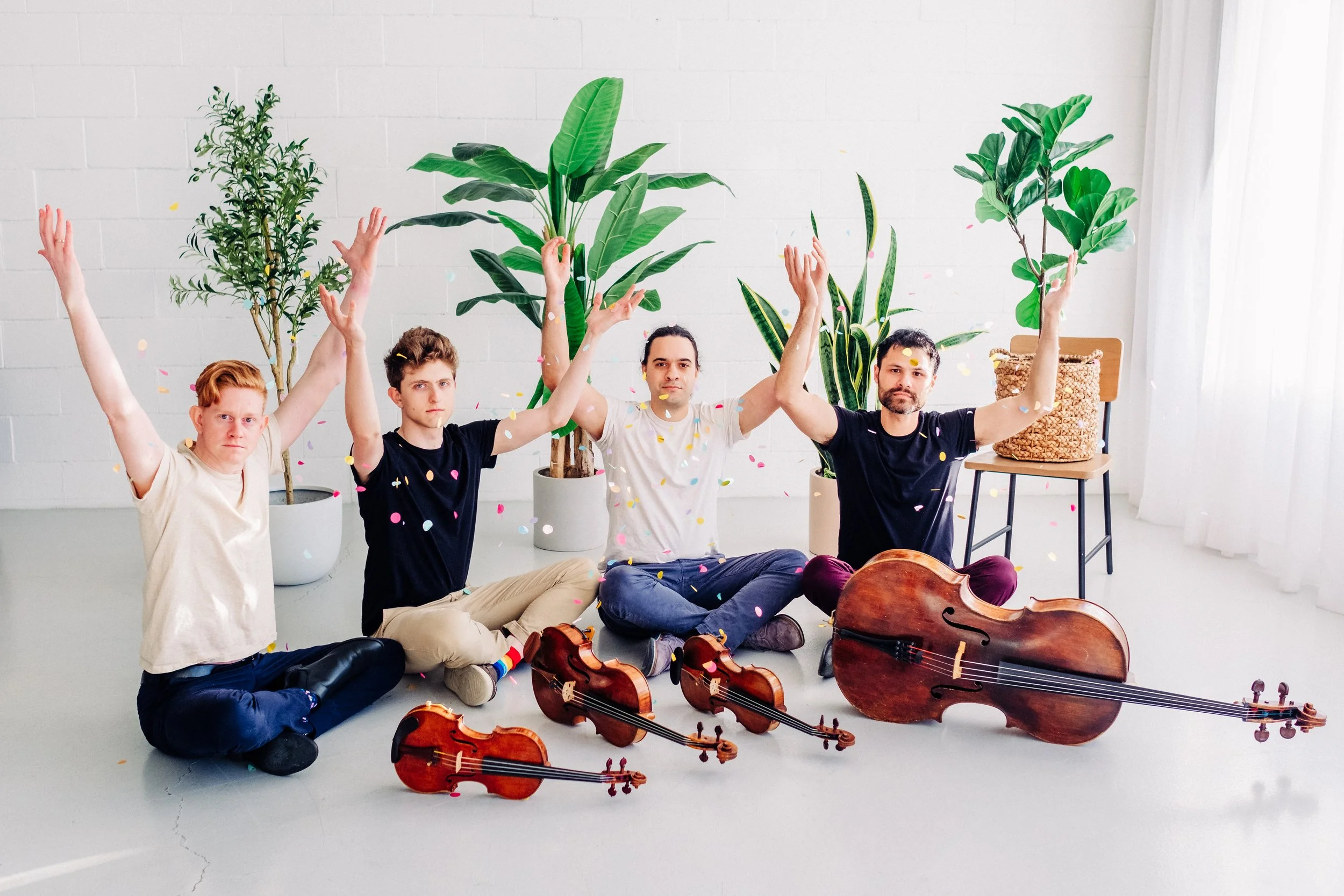Album: Canto Caló
Artist: Nicolás Lell Benavides
Record Label: Aerocade Music
Catalog No.: AM019
UPC: 195269380090
Release date: October 10, 2025
Format: Digital and CD
Digital booklet: download here
Buy/stream:
Bandcamp | Apple Music | Tidal | Amazon Music | YouTube | Spotify
CREDITS
Nicolás Lell Benavides, composer
Friction Quartet
Kevin Rogers, violin
Otis Harriel, violin
Mitzo Floor, viola
Doug Machiz, cello
Melinda Martinez Becker, mezzo soprano
Zach Miley, engineer
Cory Todd, recording engineer
Zach Herchen, mastering engineer
Samantha Godoy, album design
Recorded at The San Francisco Conservatory of Music (Bowes Center).
El Correcaminos was commissioned by Friction Quartet.
Canto Caló was commissioned by New Moon Duo with support from InterMusicSF. Written for Melinda Martinez Becker & Anne Rainwater with support from InterMusicSF, The American Composers Forum, NewMusicUSA (Creator Development Fund), and The Alice M. Ditson Recording Fund.
Canto Caló
by Nicolás Lell Benavides
Canto Caló is the enrapturing debut album by New Mexican composer Nicolás Lell Benavides. Featuring mezzo-soprano Melinda Martinez Becker and Friction Quartet, this release encompasses two major works exploring New Mexican identity, ancestral memories of grandparents, and how those live and breathe within us, cultural connections over generations and what is lost and gained when we revisit our roots.
The eponymous song cycle honors the memories of Benavides and Becker’s New Mexican grandparents through the exploration of Caló - a Spanish and English dialect spoken by zoot suit wearing Pachucos in the American Southwest. The songs draw from nursery rhymes like El Zapatero, a poem written by Benavides’ grandfather after being drafted to fight in the Korean War, and original lyrics by Benavides and Becker in the heroic style of rancheras and corridos. In the process of writing these songs they interviewed family, remembered stories of these ancestors and their experiences together, and found a new appreciation for what it means to speak Caló.
El Correcaminos is an apt salute to New Mexico's state bird, the roadrunner, with its universal and positive appeal for almost all of the cultures that intermingled there. New Mexico is the meeting place of the South, West, East, and North, much like the four-sided Zia symbol on the state flag. Puebloans lived here for thousands of years, followed by the Navajo (Diné), the Spanish, then Mexicans, and finally the Americans. Benavides found himself pondering how they all saw the same Land of Enchantment. He, like many New Mexicans, is the product of generations of love, conflict, migration, peace, war, spirituality, colonialism, and progressivism.
PROGRAM NOTES by the composer
Canto Caló
This song cycle explores the memory of grandparents and the way in which those memories live and breathe within us. Like memories, these songs are meant to sound simultaneously old and new. Remembering is an act in which memories are always changed, always refreshed. Though these memories are of specifically New Mexican grandparents (mine and Melinda’s), it's a feeling that all of us are familiar with: how do we keep memory, and therefore culture, alive? In the process of writing these songs we interviewed family, remembered our grandparents, and even learned to speak their lingo, which is a mixture of Spanish and English: Caló.
This isn't a museum piece, and it isn't a future piece, it's a piece for the present. It’s sung from the point of view of those who remember. Us.
El Correcaminos
It's difficult to capture New Mexico in one symbol. I, like many New Mexicans, am the product of generations of love, conflict, migration, peace, war, spirituality, colonialism, and progressivism. New Mexico is the meeting place of the South, West, East, and North, much like the four-sided Zia symbol on our state flag. Puebloans lived here for thousands of years, followed by the Navajo (Diné), the Spanish, then Mexicans, and finally the Americans. I've found myself pondering how they all saw the same Land of Enchantment, and how that inevitably led to my existence, a person whose ancestors fought bitterly and occasionally loved each other in the face of animosity.
New Mexico's state bird, the roadrunner, has a universal and positive appeal for almost all of the cultures that intermingled there. Roadrunners are beautiful, athletic, fearless, and mysterious. They notably have four toes and nearly symmetrical feet, with two toes facing forward and two facing backward. The concept of symmetrical groupings of four is paramount. The triad with both a major and minor third plays an outsize role in all movements since it holds two major thirds and two minor thirds as a palindrome (C E Eb G). The triad in inversion, as Bartók was obsessed with, makes appearances as well for its symmetry (E G C Eb). Augmented harmony and triad shapes (C E Ab C) perfectly divide an octave into four pitches, and this material is woven throughout. The piece goes in reverse chronological order of the people who arrived.
The first movement, “Chaparral Bird", is about the Americans heading West. Their primary concern was getting lost and their superstition was that the roadrunner would lead them back to the trail. It's about wading into the unknown and finding your way again.
The second movement, "El Correcaminos", is primarily about the Mexicans who arrived (influenced by the Spanish) from the South (and somewhat the West) in the 18th and 19th centuries. They were looking to settle permanently, and saw el correcaminos as a fertility blessing like a stork. They were elated to see one, as it meant there was a future in this place.
The third movement, "Tadai", takes its name from the O'odham Language, one of the many Uto-Aztecan languages. The Hopi, one of the diverse groups of Puebloans in the Southwest (who speak a language in this family called Hopi), believed that the roadrunner could protect against evil spirits. The symmetrical feet could conceal which direction the bird was headed, making them difficult to track. This movement uses symmetrical structures that are constantly rotating and breaking. The movement feels repetitive, but never exactly repeats itself.
The fourth movement, "Cyx", is how I imagine the roadrunner thinks of itself. The name comes from the scientific name for roadrunner, "Geococcyx." As a child I would see how close I could get to one, and then I'd find myself retreating as I realized the bird was not about to cede ground to me, a creature it has survived and lived alongside for thousands of years. This movement combines elements from all the previous movements and bolts frantically from one bit of material to the next.
My biggest thanks to Friction Quartet for making this piece possible, through it I’ve had so much fun imagining the world through the roadrunner’s eyes.
ABOUT THE COMPOSER
Photo credit: Samantha Godoy
Nicolás Lell Benavides’ music has been praised for being “resourceful and wonderfully eclectic” (Joshua Kosman, On a Pacific Aisle) and “dramatically tight and musically transporting” (SF Chronicle). He is a 2024-25 Guggenheim Fellow and has received commissions from groups like The New York Philharmonic/The Juilliard School, the LA Philharmonic with Gustavo Dudamel, Eighth Blackbird, New Century Chamber Orchestra with Daniel Hope, SFCM Orchestra with Edwin Outwater, West Edge Opera, Washington National Opera, The Glimmerglass Festival, Music of Remembrance, Left Coast Chamber Ensemble, Fry Street Quartet, Friction Quartet, Brightwork newmusic, and Khemia Ensemble. His music has received support from organizations such as the American Composers Forum, The Barlow Endowment, New Music USA, Opera America, the Alice M. Ditson Fund, and the National Endowment for the Arts.
Nicolás’ Guggenheim Fellowship will allowed him to focus on upcoming projects including his Barlow Foundation commission for Eighth Blackbird, a new song cycle to premiere with the LA Phil based on Neruda’s poetry (Sueño en mi sueño) for oboist Anne Marie Gabriele and tenor Joshua Blue commissioned by Elizabeth and Justus Schlichting, and his opera Dolores. His opera about civil rights icon Dolores Huerta, commissioned by West Edge Opera, will also premiere with San Diego Opera, The BroadStage, and Opera Southwest beginning in 2025. Dolores, with libretto by Marella Martin Koch, tells the story of a pivotal moment in civil and labor rights when the Dolores Huerta, César Chávez, and Larry Itliong coordinated the United Farm Workers to fight for Senator Bobby Kennedy be elected president to help with the Delano Grape Strike and Boycott. He is also developing an opera called Caravana de mujeres with librettist Laura Barati as part of MassOpera’s New Opera Workshop, which was a featured performance at Opera America’s New Works Forum.
He recently premiered Querencia with the New York Philharmonic and The Juilliard School Pre-College program, with support from the American Composers Forum as part of Composing Inclusion. He was a fellow at the Eighth Blackbird Creative Lab and the Gabriela Lena Frank Creative Academy of Music, where he was part of the Composing Earth initiative. Nicolás was the first ever Young Artist Composer in Residence at The Glimmerglass Festival and has been a fellow at the Del Mar International Composers Symposium. His music has been heard all over the United States, including in Carnegie Hall’s Weill Recital Hall, and as part of the California Festival with New Century Chamber Orchestra and The San Francisco Girls Chorus. He was the first featured composer/conductor with the San Diego Symphony’s Currents Series in the new Jacobs Center.
He premiered a new opera for Washington National Opera called Pepito with librettist Marella Martin Koch. He and Marella also premiered a new opera, Tres minutos, with Music of Remembrance in 2022 with generous support from the National Endowment for the Arts. He is the 2025-26 Composer-in-Residence with the Grammy winning San Francisco Girls Chorus, and will also be a 2025-26 visiting artist as part of Santa Clara University’s Sinatra Chair in the Performing Arts. Other upcoming projects include an upcoming album (Canto Caló) on Aerocade Records with Friction Quartet and mezzo-soprano Melinda Martinez Becker, a new work for Gustavo Dudamel and the LA Phil with filmmaker Alejandro González Iñárritu, and a new song cycle for mezzo-soprano Kelley O’Connor.
Nicolás has studied at Santa Clara University, the San Francisco Conservatory of Music, and at the University of Southern California Thornton School of Music.
More at nicolasbenavides.com.
ABOUT THE ARTISTS
Photo credit: Kersh Branz
Melinda Martinez Becker
Melinda Becker’s New Mexican and Jewish heritage shapes her career as a performer of song in Spanish, Ladino, Yiddish and a variety of other languages. As a soloist and chamber musician, she is recognized for her expressive interpretations of diverse repertoire, from contemporary classical to baroque, to mariachi, and popular music.
Melinda’s work with contemporary composers and dynamic ensembles includes collaborations with Nicolás Lell Benavides, Friction Quartet, Brian Baumbusch, Emily Koh, the Musical Art Quintet, and as a soloist with the Classical Revolution Orchestra and the Ukiah Symphony Orchestra.
In 2026, she will collaborate with the Musical Art Quintet to record Kanta Judezmo, a ten-movement oratorio in the Ladino language, composed by bassist Sascha Jacobsen with text by Bobby Coleman. Together with Friction Quartet, she recorded Canto Caló, an album of music by Nicolás Lell Benavides, which will be released in Fall 2025 on Aerocade Music.
Melinda studied at Santa Clara University, the San Francisco Conservatory of Music, and the Conservatoire de Strasbourg in France. She has also studied Spanish chamber music and art song through Project Canción Española at the Escuela Superior de Canto in Madrid, and Música en Compostela in Santiago de Compostela, Spain.
Photo credit: Debra Cheung
Friction Quartet, lauded for performances described as "terribly beautiful" (San Francisco Classical Voice), "stunningly passionate" (Calgary Herald), and "exquisitely skilled" (ZealNYC), is dedicated to modernizing the chamber music experience and expanding the string quartet repertoire. The quartet achieves its mission by commissioning cutting-edge composers, curating imaginative concert programs, collaborating with diverse artists, and engaging in interactive educational outreach.
Friction made their debut at Carnegie Hall in 2016 as participants in the Kronos Quartet Fifty for the Future Workshop. They returned in March of 2018 to perform George Crumb’s Black Angels as part of “The 60’s” festival and their performance was described as, “one of the truest and most moving things I’ve ever heard or seen.” (Zeal NYC) Friction’s video of the second movement of First Quartet by John Adams was named the #2 video of the year in 2015 by Second Inversion. John Adams shared this video on his own homepage and called it “spectacular.” Friction and Andy Akiho released a video of his piece, In/Exchange which was chosen by Second Inversion for their Top 5 videos of 2016 and was featured on American Public Media’s Performance Today.
Since forming in 2011, Friction has commissioned 47 works for string quartet and given world premiere performances of more than 100 works. They developed the Friction Commissioning Initiative in 2017 as a way to work together with their audience to fund specific commissions. The money raised to date has helped Friction commission a total of 16 new works, including six by young composers between the ages 16 and 21. Their most recent round of commissioning focuses on music written primarily for album format and includes composers Michi Wiancko, Andrew Rodriguez, Alex Dowling and Annika Socolofsky.
Friction has won two grants from Chamber Music America to commission a piano quintet from Andy Akiho and Comedia for string quartet, vocal quartet and harpsichord by Paul Mortilla. They have also won project grants from Intermusic SF and Zellerbach Family Foundation supporting the performance of commissioned works.
While Friction has garnered international attention as commissioners and interpreters of new music, they are also devoted to performing masterworks of the string quartet repertoire at the highest level. They won Second Prize in the 2016 Schoenfeld Competition, they were quarter-finalists in the 2015 Fischoff Competition and placed second at the 2015 Frances Walton Competition.
Friction has held residencies at the New Music for Strings Festival in Denmark, Interlochen Arts Camp, Lunenburg Academy of Music in Nova Scotia, and was the first ensemble in residence at the Center for New Music in San Francisco.
Friction Quartet is dedicated to building new audiences for contemporary music through interactive musical enrichment programs. They were awarded a 2019 Intermusic SF Musical Grant to develop a participatory educational program with composer Danny Clay that is designed to be accessible and sensory-friendly. They participated for three consecutive years in the San Francisco Symphony’s Adventures in Music program, visiting over 60 public schools annually. They have also given presentations at Oakland public schools through KDFC’s Playground Pop Up program. In collaboration with Meridian Hill Pictures, they created a short documentary, titled Friction, that profiles their early educational outreach in Washington DC’s Mundo Verde Public Charter School. Their presentations regularly utilize Doug’s adventurous arrangements of pop songs alongside excerpts from standard string quartet repertoire to help young audiences build connections to musical concepts.
Friction appears on recordings with 3232 Music, National Sawdust Tracks, Innova Records, Albany Records, Pinna Records, and many independent releases. They released their full-length debut album, Resolve, in 2018 through Bandcamp, and followed up with Rising. Friction has appeared on radio stations such as NPR, KALW, KING-FM, and KUT, among others.
Friction Quartet takes risks to enlarge the audience’s understanding of what a string quartet can be using arrangements of pop music, digital processing, percussion, amplification, movement, and additional media. Their multimedia and interdisciplinary projects have received critical acclaim. In 2017 they produced Spaced Out, an evening-length suite of music about the cosmos that utilizes surround sound electronics and includes a Friction Commission written by Jon Kulpa. The San Francisco Classical Voice called it “accessible, yet surreal.” No matter where their musical exploration takes them, they never lose sight of the string quartet’s essence– the timeless and endlessly nuanced interaction of four analog voices.





